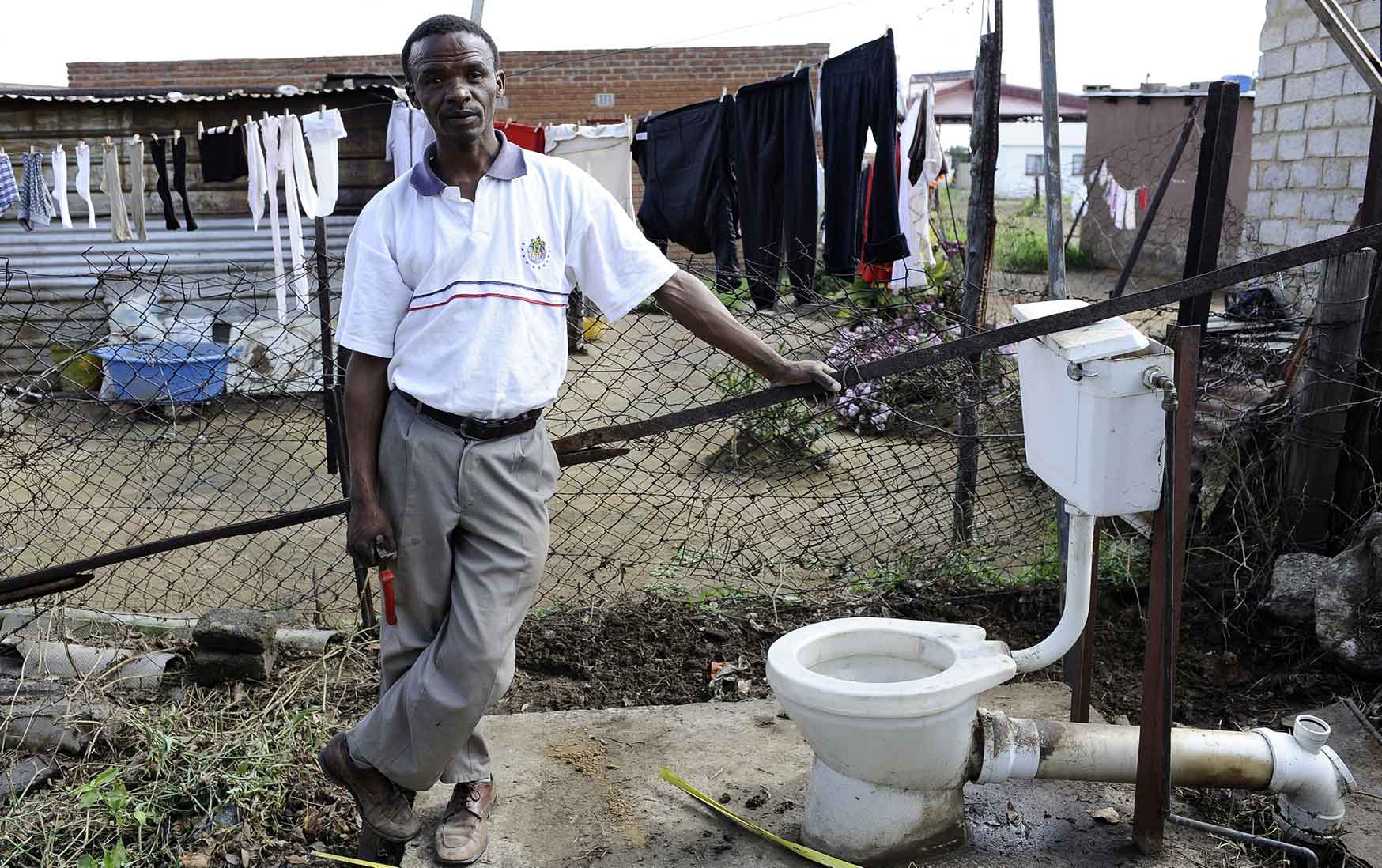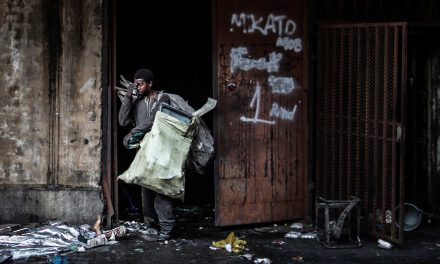Elephants are a wonderful metaphor, not least in Africa. The largest land-based animals on earth, they are an unmissable presence in any environment. And so, when something looms large and intrusive – and is perhaps deliberately ignored – it is “the elephant in the room”. Where powerful forces contend for dominance in disregard of those around them, it evokes the comment that “when elephants fight, it is the grass that suffers”.
Governance in South Africa has come increasingly to resemble that devastated savannah. South Africa is planted over with an array of public institutions – invariably with “developmental” mandates – but few of which can claim to operate effectively. This is now common cause, such that even the president, Cyril Ramaphosa, has made “building” a capable state central to his agenda, and “professionalising” the public service is state policy.
For ordinary South Africans, “corruption” has become a byword for the failings of governance. Over the years, this has been on public display through an unremitting progression of scandals. The Zondo Commission spent close to four years sifting through evidence about the phenomenon of “state capture”, a phrase conveying all-embracing malfeasance.

Corruption needs to be understood properly. The appropriation of money or other resources is qualifiable and easily understood, and because it has a clearly recognisable moral dimension, it invites outrage. But if corruption is recognised – as it should be, etymologically – as a process of perversion and suborning, it involves much more. Properly functioning institutions are essential to effective states, especially constitutional democracies as South Africa was designed to be. Where institutions fail, where they cease to serve a rational purpose for the public good, and cease to do so transparently and with integrity, state failure looms. These are high stakes indeed.
The Zondo Commission didn’t expose a great deal that was unknown, although the scale of pathology it reported on shocked the country. It did, however, perform a service by looking beyond the looting of public resources and the failures of the formal institutions meant to steward them. Foremost here was its interrogation of the ruling African National Congress (ANC) and its internal processes. “The interface between the party and state is of concern to the Commission,” said Zondo in his report, referring to the ANC’s programme of cadre deployment.
In broad terms, cadre deployment is the party programme to install loyal party activists (cadres, in ideological parlance) in all important areas of public life. For the ANC, cadre deployment was the mechanism by which the state would be brought under its control, not as a temporary incumbent in government, but as a political party, or – to use its own nomenclature – a national liberation movement.
A document published in the ANC’s journal Umrabulo in 1998 was unequivocal about this. Explaining that party control was fundamentally a matter of “transformation”, it stated: “Transformation of the state entails, first and foremost, extending the power of the National Liberation Movement (NDR) over all levers of power: the army, the police, the bureaucracy, intelligence structures, the judiciary, parastatals, and agencies such as regulatory bodies, the public broadcaster, the central bank and so on.”
In other words, very little would be beyond the party’s reach and control. This was a matter of historical responsibility and ideological conviction. But it was by no means limited to political offices, such as roles within the ANC or membership of parliament.
Accountability advocate Paul Hoffman, who has been tracking the issue for years, put it like this to Africa in Fact: “It is the policy of the ANC-led alliance to use cadre deployment in all areas in which it governs and in all other sectors. This policy is aimed at securing hegemonic control of all levers of power in SA society – society mark you, not just government.”
To achieve this, party deployment committees would be established to place cadres in appropriate positions. This would, so the justification went, ensure that political fervour would be matched with technical and professional skills.
Yet growing evidence suggested a more sinister reality. For a long time, cadre deployment was something of an elephant in the governance room. Certainly, governance failings were growing. Talk of “capacity constraints” abounded. If ever cadre deployment was meant to push a developmental agenda, it wasn’t delivering on this.
The appointment of senior ANC members to positions that demanded non-partisanship caused some unease. So did the sometimes lacklustre responses of such figures when faced with misconduct by those within the orbit of the ruling party. Lawrence Mushwana, who was Public Protector from 2002 to 2009 came under criticism for a number of decisions that worked to the benefit of the ANC. The late Rhoda Kadalie, public intellectual and activist, said that like many in similar positions, he had been “co-opted into uselessness, [and] dares not bite the hand that feeds him”. Steven Mohale, political editor of The Citizen wrote: “His findings have fuelled the perception that his office is an inefficient watchdog, whose primary role is to merely vindicate ANC top brass who have been accused of wrongdoing.”

A resident stands by an open-air toilet in Ramoulutsi township, near Viljoenskroon, South Africa. Top ANC party officials visited the community days before the local elections in May 2011 to do damage control after it emerged the ANC-run municipality had built about 1,600 open-air toilets, some as far back as 2003. (Photo: Stephane De Sakutin/AFP)
Indeed, the legal deficiencies of cadre deployment slipped into the open in a 2008 judgment in the Eastern Cape High Court, Mlokoti vs Amathole District Municipality. In this case, a municipal manager had been appointed on the instance of the ANC’s deployment structures in preference to an objectively superior candidate. The court set the appointment aside, noting that external interference in such appointments was illegal.
The defenestration of Thabo Mbeki from the leadership of the ANC and the accession of Jacob Zuma demonstrated the rifts that existed within the ANC. Having embedded the party so firmly within the state, party divisions were bound to spill out into the administration, compounding the dysfunctionality that existed. Peter Franks of Stellenbosch University wrote in 2014: “Because public service placement became so politicised, incumbents too often spent their time garnering political favour and looking for their next position.”
The effect was particularly pronounced at local government level. Posts were plentiful (often amid grinding poverty) and scrutiny relatively light. By 2009, an official report on local government warned of problems in the “political/administrative interface” (a diplomatic phrase that was widely taken to mean the outcome of cadre deployment), with factional feuds developing, often less about politics or ideology than about cravings for public resources.
Official responses talked ceaselessly about upgrading skills, recruiting expertise, and demanding the highest standards of probity from public servants. Yet all of this missed the proverbial elephant in the room – a parallel structure of authority, ultimately beholden to the party above and before official accountability within the formal structures of the state. Yet since cadre deployment was taking place out of official sight, and seldom acknowledged in relation to specific individuals, it was an almost ethereal presence, real enough to be discerned but abstract enough to evade proper scrutiny.
The Zondo Commission’s probes into the workings of the cadre deployment system may well have been the most significant aspect of its enquiries. Although not a court of law, findings carrying the imprimatur of the chief justice of the country have a weight that is difficult to ignore. It described cadre deployment as counter to the constitution and illegal, portraying it as a key part of the process of state capture. “Above all,” the report said, “it is unlawful for any government functionary to implement a recommendation of the Deployment Committee in the filling of any post in the public service in which section 11 of the Public Services Act applies (this section of the Act supplies criteria for public service appointments, which do not include political alignment as a factor).”
The commission obtained ANC deployment committee meeting minutes for the period 2018 to 2020, uploading them to its website in early 2022. The elephant now taking shape, they provided some first-hand insight into the practice. Although some analysts tried to argue that the minutes did not show an exaggerated sense of concern for the party loyalties of prospective deployees – sometimes focusing on gender representativity, for example – there were clear concerns that the committee was in fact discussing appointments to the judiciary and to offices constitutionally mandated to be impartial.
This exposed the nub of the problem. It hardly mattered whether iron-clad party loyalty was the criteria for deployment or not; the ANC as a party had absolutely no business mediating these positions. In a very real sense, this had been the original state capture.
Politicisation of South Africa’s institutions has greatly damaged them. Unsuitable incumbents have abused them and used them for factional battles. They have been diverted from the purposes for which they were designed – in fields ranging from energy provision to law enforcement to public accountability – to serve other interests with varying degrees of legality.
The reality of this is not lost on the country’s civil society and business communities. Steven Gruzd of the South African Institute of International Affairs, who has conducted extensive work on African governance, notes that the issue has come up repeatedly in relation to South Africa’s governance ailments. He told Africa in Fact: “Independent institutions to promote and protect the constitutional order have been undermined by the state capture project, not least through the pervasive policy of ‘cadre deployment’, where loyalty to the party counts more than integrity, ability or fitness for the job.”
Even South African business – for decades reticent about intruding into political territory – has weighed in. Dr Simo Lushaba of the Institute of Directors of South Africa said cadre deployment was debasing the country as a whole: “We cannot convince any entities, public or private, to appoint leaders based on their competence and merit, while still driving transformation, if the head of state and his ruling party cling so tightly to their brand of political nepotism.”
Hoffman comments: “The aim is to collapse party and state into one and to allow the loyal cadres of the NDR to feast on the carcass so created”. This assessment is broadly correct, although whether the cadres were defined by loyalty or by opportunism is a matter for debate. That cadre deployment has contributed to reducing the state to a carcass is hard to dispute. Indeed, the National Development Commission lamented in a 2021 report, that there was a “rejection of meritocracy in the public service”.
In the same vein, Professor William Mervin Gumede of the University of Witwatersrand wrote last year that cadre deployment stands in diametric opposition to a state’s developmental imperatives, not only in South Africa but across the continent. He contends that much of the malaise can be traced to misappointments, which “are mostly done so only based on their loyalty to the ANC or dominant faction, not on their competence.”
These are harsh indictments. Neither the Zondo Commission’s revelations nor the supposed imperative of professionalising the state have had much impact on the ANC’s thinking. The refrain has been that cadre deployment is a universal practice and that any failings in the South African case point to lapses in its implementation, not in the concept itself. The scathing remarks about the practice in the commission’s report have been dismissed as not being a legal finding, but Hoffman retorts that this position is untenable since the commission merely restates the position of the Constitution, the law and legal precedent (unchallenged) established in the Mlokoti case.
Attempts to introduce legislative changes explicitly to outlaw political interference in civil service appointments have likewise failed to move beyond the committee stage, with ANC members expressly defending cadre deployment (Although oddly, a strategy for the professionalisation of the public service has been accepted by the cabinet, which somewhat gingerly refers to the need to dispense with political interference in appointments).
The opposition Democratic Alliance (DA) has sought to challenge cadre deployment in the courts. In early 2023, it scored a significant coup when the Johannesburg High Court ordered the ANC to hand the DA all records of its cadre deployment committee going back to 2013 – the so-called state capture period, and incidentally the period during which Rampahosa headed the body. The ANC has appealed.
The impression is very much of trying to make the elephant fade from view. But it will not.
“Those deployed by the ANC,” writes Gumede, “are accountable to the party leadership, not the Constitution, the public interest or to their public service pledges – leading to an immediate conflict of interests. It also undermines accountability as appointees serve the ANC first, before they serve the country. Unless stopped now, the ANC deployment policy will be responsible for the total collapse of the state, economy, and social breakdown.”
The implications are profound. Broken and compromised institutions in South Africa are steadily compounding the country’s socioeconomic crises, and spurring frustration with the state of democracy itself. Cadre deployment may well have served the ANC as a tool for its hegemony and a means for dispensing patronage. But like the elephants of metaphor, its ghostly presence continues to trample over the country’s governance system.
Terence Corrigan is an independent researcher, political consultant, writer, editor and illustrator. He is currently a research fellow at the South African Institute of International Affairs (SAIIA) in its Governance and African Peer Review Mechanism Programme and a policy fellow at the Institute of Race Relations (IRR).












